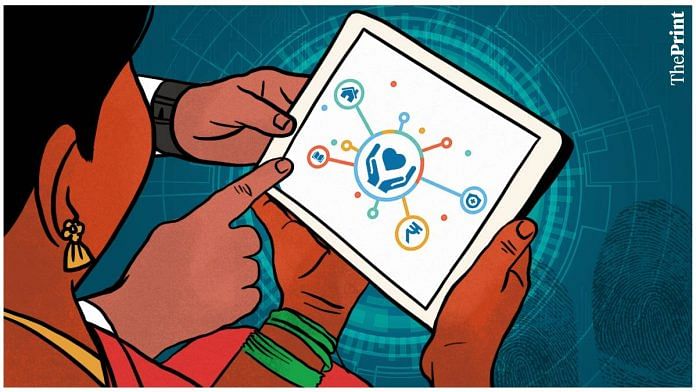The recently concluded first G20 Finance Ministers and Central Bank Governors meeting, held in Bengaluru, reiterated the importance of leveraging digital public infrastructure to enhance service delivery efficiency. DPIs are technological solutions designed to facilitate the exchange or transfer of information and money. For example, ID systems and citizen databases, which aid in identifying and verifying individuals by exchanging information, and payment systems like UPI or Direct Benefit Transfers, which facilitate fund transfers. Although DPIs have only recently become a part of mainstream policy discourse, their development and use in delivering welfare benefits have been monitored for some time.
A prominent example of DPIs at the state level include resident databases and ID systems to determine residents’ eligibility for welfare schemes, verifying their details and distributing welfare benefits. These are being deployed or developed across several states in India. The Parivar Pehchan Patra (Family ID) in Haryana, Jan Aadhaar Resident Data Repository and the Jan Aadhaar Card in Rajasthan, and State Family Database and the Makkal ID in Tamil Nadu are some examples of such systems.
These databases are the central components of welfare delivery tech platforms, which we refer to as social protection open digital ecosystems (SP-ODEs). They are the next frontier in the digitisation of welfare delivery systems.
Typically, a welfare delivery chain includes functions such as citizen identification, payment processing, benefit delivery and grievance redress. In SP-ODEs, each of these functions is performed by interoperable digital platforms that come together to form an SP-ODE. For example, Jan Aadhaar Yojana is the SP-ODE in Rajasthan. In that system, citizens are identified by the Jan Aadhaar Resident Data Repository. Similarly, payments are processed by the Rajasthan Payment Platform, benefits are delivered by eMitra, and Rajasthan Sampark redresses grievances.
Interoperability distinguishes SP-ODEs from previous digital welfare delivery systems because it allows information to flow seamlessly between different parts of the system. Citizens share their information only at the time of creating the database, and administrators access the database to verify that information. This enables citizens and administrators to save time and effort while applying for and processing welfare benefits.
While the promise of SP-ODEs is compelling, it is worth reiterating that deploying such ecosystems would not automatically translate into better welfare delivery. In fact, SP-ODEs can introduce new and unique challenges into the welfare chain.
We believe these four principles should inform the design of an SP-ODE:
Also read: Inclusive, efficient, accountable — how to make digital welfare platforms more citizen-centric
The need to be inclusive
It is generally understood that eligible citizens get excluded from welfare delivery at the identification stage due to inaccurate targeting methodologies. However, our primary work with DBT beneficiaries suggests that eligible citizens could be excluded at any stage of welfare delivery. We refer to this as incidental exclusion. It could arise from data mismatches, transaction failures, or citizens’ inability to access delivery channels. These gaps in design also have an outsized impact on the digitally excluded and people with physical disabilities. Instituting multiple, deep, offline access infrastructures to support the online access points and designing for the differently abled could help address incidental exclusion.
The need to be responsible with citizen’s data
The citizen databases at the heart of any SP-ODE collect, use, and exchange people’s personal data. This makes SP-ODEs highly data-rich systems; therefore, they must be developed within a legislative framework. Provisions should be laid down for protecting data and preserving privacy. For instance, privacy-by-design provisions such as privacy impact assessment, informed consent, purpose and collection limitation, data encryption and breach notifications must guide the operations of citizen databases.
To create efficiencies for citizens
Ironically, SP-ODEs could also create unintended but significant inefficiencies of time, cost, and effort for marginalised citizens. Digitisation could create rigidity in the delivery mechanisms, reducing the scope for human discretion. Combined with digital illiteracy, lack of awareness and resource constraints, this could further cause exclusion. For example, a report from Jharkhand showed that retrieving a lost Aadhaar number was so laborious and cumbersome that without expert assistance, the citizen may have been excluded. Simple procedures with well-established exception-handling mechanisms, intuitive citizen interfaces, and availability of trained staff at physical touch points could overcome these potential sources of inefficiency.
The need to be accountable
Reduction in human interaction also limits the ability of the citizens to negotiate with an administrator, as the rules of digital interaction bind them. Often citizens have no say in setting such rules and exercise no power over the functioning of SP-ODEs. Additionally, in welfare delivery, service providers such as common service centres (CSCs), ration shops, or hospitals have little incentive to serve citizens due to the absence of price as a disciplining factor. It often manifests in last-mile agents treating citizens disrespectfully, overcharging or cheating them on their entitlements. In our research, we found that the CSCs overcharge citizens by 236 per cent for issuing caste, birth, and death certificates among other important documents. Therefore, citizens need to be empowered vis-à-vis the SP-ODEs. Mechanisms such as a robust grievance redressal system, feedback system, ability to rate service providers, and publication of performance reports can help make an SP-ODE accountable to the citizens.
Preserving citizens’ interests in this journey of welfare digitisation is imperative. Great care must be taken to ensure that these systems are inclusive, responsible, efficient, and accountable by design.
Lakshay Narang is a Research Associate with the Future of Finance Initiative at Dvara Research. He studies exclusion and data governance in the course of digital welfare delivery.
(Edited by Ratan Priya)



